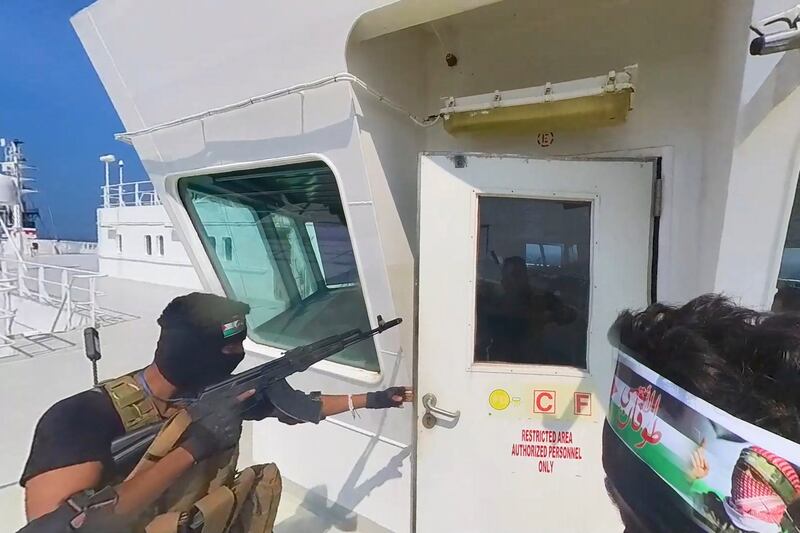Seventeen Filipino seafarers were on board an Israeli-linked cargo ship that was seized in a helicopter-borne attack by Houthi rebels off the coast of Yemen, the Philippine foreign affairs department said Wednesday.
Yemen’s Iran-backed Houthis took control of the Galaxy Leader cargo ship on Sunday in the southern Red Sea, describing it as Israeli-owned, according to reports.
Footage released by the rebels showed a maneuver in which they dropped from the helicopter brandishing assault rifles, before quickly seizing control of the vessel and raising Palestinian and Yemeni flags.
“There were 17 Filipinos according to the manning agency... together with other foreigners,” Eduardo de Vega, an undersecretary at the Department of Foreign Affairs, said in a statement.
“We are alarmed. This is not the first time Filipino seafarers were held hostage. This is connected to the war between Hamas and Israel because the ship was targeted because it was allegedly Israeli-owned although the operator was a Japanese company.”
The Bahamas-flagged car carrier is chartered by Japan’s Nippon Yusen. It is owned by a firm registered under Isle of Man-headquartered Ray Car Carriers, which is a unit of Tel Aviv-incorporated Ray Shipping, according to LSEG data, according to Reuters.
The Philippines was making diplomatic representations to all foreign governments involved, he said, adding the Houthi rebels had given assurances that the foreign hostages would not be harmed.
Some 25 crew members from the Philippines, Bulgaria, Ukraine, Mexico and Romania are reported to be on the ship.

Foreign affairs department spokeswoman Maria Teresita Daza said Manila was deploying an “all-of-government approach” to help the Filipino crew.
“We assure the public that everything is being done to get our seafarers back safely,” said Daza.
The Philippine government estimates there are 10 million Filipinos working overseas as professionals, maids, laborers and seafarers. Their remittances have traditionally propped up the economy, but many endure tough and dangerous working conditions.
At present, there are about 400,000 Filipinos working in the shipping industry across the globe, from Taiwanese fishing vessels and trawlers to European cargo ships, official figures showed.
Filipino seafarers have been targeted in attacks and kidnapping attempts before.
In 2018, seven Filipinos were among a dozen crew members of a Swiss-owned ship who were kidnapped by pirates off the coast of Nigeria. The captives were released unharmed after a month.
In 2011, Filipino seafarer Farolito Vallega, 48, was aboard a German-owned ship, MV Beluga Navigation, when he was shot and killed by Somali pirates.
Data from the United Nations International Maritime Organization showed more than 5,700 seafarers have been taken hostage in various incidents globally since 2007 and subjected to prolonged captivity.
On a daily basis, more than 100,000 seafarers experience anxiety while sailing in, or towards, dangerous waters, the U.N. agency said.
Jeoffrey Maitem contributed to this report from Davao City, southern Philippines

